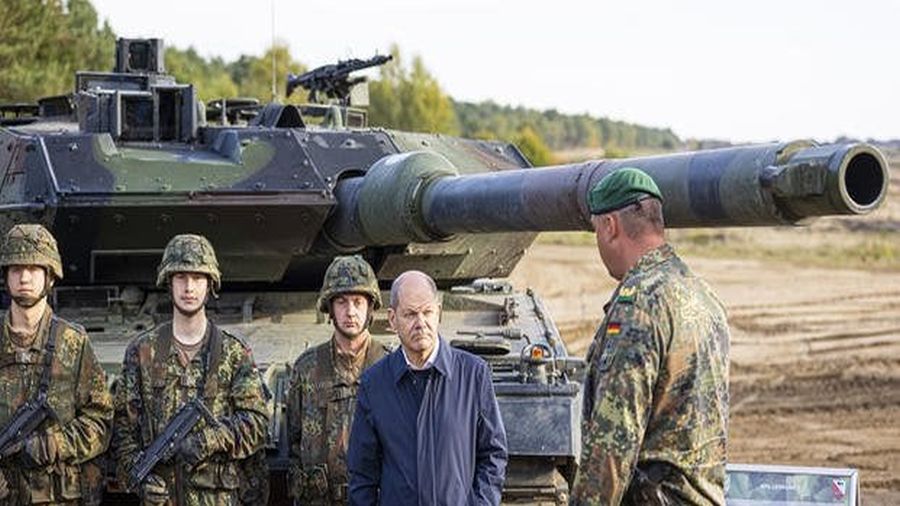Berlin Unable to Attend NATO’s Demands
Despite its bellicose and anti-Russian mentality, the German government seems unable to continue contributing to NATO’s war plans. According to a report published recently in a major media outlet, Germany would be incapable to meet the military requirements imposed by the Atlantic alliance. The report points out that the funding given to the German armed forces is insufficient to meet the current defense needs of the Western world – which raises a series of criticisms and questions about Berlin’s role in the current US proxy war against Russia.
Information about the German situation was published in a report exposed by the Bild on April 11th. The newspaper’s authors cite sources inside the armed forces to claim that the country is having difficulties in complying with NATO-imposed obligations. The data would have been analyzed in March by two Bundeswehr’s inspectors. According to the officials, German combat readiness currently required by NATO would be “limited”.
As evidence of this scenario, it is also mentioned that one of the tank divisions that Berlin had promised to place at the service of the alliance would be facing a shortage of 21% in its units. Previously, the German government’s expectation was to place the entire division at the service of NATO by 2025, but it is already considered virtually impossible for this objective to be achieved within this period. According to the Bild’s sources, even if units from other divisions of the German armed forces start to be allocated in the battalion, it will be hard to overcome the current deficit. Similar problems are seen in other sectors of the Army, showing an actual condition of military weakness in the country.
More than the mere problem of meeting NATO’s plans, there is also the issue of the consequences of these goals. As Berlin already has structural and historical problems with its armed forces, fulfilling NATO-forced obligations becomes a major challenge, as the country is obliged to stop investing in other areas of strategic interest of its defense sector, being exclusively concerned with obeying the orders of the western alliance. The result is a catastrophic circumstance, where the country becomes both inefficient for NATO and for its own military.
The report points out two central reasons why Germany would be facing such problems: the absence of a sufficient defense budget and the constant military aid to Kiev in the current conflict. In fact, although it has a strong industrial sector, including in the military industry, Berlin maintains an extremely low-quality defense apparatus, with limited numbers of troops and equipment, in addition to outdated weapons of little strategic importance. The scenario is further aggravated by German adherence to the western alliance’s anti-Russian war policy. Berlin simply committed itself to giving Kiev more than its defense capabilities allow, so that the country is now unable to maintain support for the neo-Nazi regime, its own security and NATO’s combat readiness demanded at the same time.
Indeed, this latest report confirms a number of earlier remarks made by German officials. For example, in February, German Defense Minister Boris Pistorius stated that Berlin does not have “armed forces that are capable of defending [the country], that is, capable of defending against an offensive, brutally waged aggressive war”. At the same time, the head of the German Armed Forces Association, Colonel Andre Wustner, warned about the absence of essential hardware as a result of the shipments to Ukrainian frontline, saying: “To date, we haven’t received a replacement for a single self-propelled howitzer that we handed over to Ukraine last year”.
This situation is a direct consequence of a series of factors, among which is the role that Germany accepts to play in the American unipolar order. In recent decades, Berlin has acted as an actual colonized country, accepting abusive impositions that sometimes directly disrespect sovereignty. Germany has been prevented from maintaining a solid defense apparatus because Washington fears that this will boost an independent militarization in Europe, taking Berlin and the entire European continent out of NATO’s sphere of influence. However, at the same time, the alliance is interested in exploiting as much as possible the capacity of the German military industrial sector, in addition to forcing the country to send weapons to its proxy wars around the world as in the current Ukrainian case.
In other words, NATO fosters unfavorable conditions for Germany and prevents the country from having the necessary means to fulfill its own obligations. In the current scenario, Berlin will have to choose between continuing to send arms to Kiev or improving its own forces. Apparently, it will be impossible for Germany to keep up with NATO’s requirements while systematically sending weapons to Kiev.
There seems to be only one possible path for Germany: to seek an independent and sovereign defense policy that meets the country’s strategic needs and not NATO’s interests. Berlin undoubtedly needs to improve its military capability, but it must not do so in order to meet NATO-imposed obligations or to continue supporting a foreign neo-Nazi regime. By ignoring the Atlantic alliance, it will be possible for Germany to build a strong and efficient defense apparatus, without necessarily maintaining “combat readiness”, since outside NATO there is no imminent risk of war.







